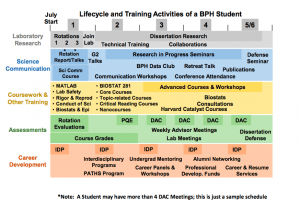
The BPH program offers a firm foundation in the basic biomedical sciences. The majority of training is laboratory-based, starting with a requirement for three, 10-week laboratory rotations over the first year, followed by full-time doctoral research in a chosen laboratory in the subsequent years. The program also features interdisciplinary training, with students taking courses in several parts of the Harvard academic community to meet their individual needs. Students must complete courses in at least four of seven core areas (molecular biology, cell biology, biochemistry, genetics, physiology, toxicology/cancer cell biology, immunology/ infectious diseases), as well as biostatistics and epidemiology. Our curriculum also emphasizes the development of critical reading skills to understand and asses the primary literature in one’s field.
At the end of the second year, students must take a preliminary qualifying examination to assess their ability and preparation for an original, laboratory-based scientific investigation. It is expected that the student’s doctoral research will result in the publication of one or more original research papers. Following completion of their doctoral research, students must write and defend a dissertation before being awarded the PhD.



